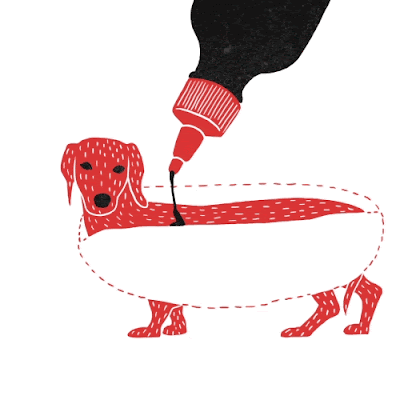補習了那麼久,你提升的是考試經驗還是英文程度?我們都應該要立志當個deep learner!
 |
| animation by Min Liu/via Pinterest |
Dear Class,
我在補習班任教,但是課堂上分享與傳授的絕非只有考試的策略與答題密技。因為生命裡不可能只有幾場托福考試,人生的路還長得很。
之前發文曾說過,來教練這邊上課不是補習,因為我不以補習的心態去教學生。來教練這邊是為了學些一輩子受用的技巧跟能幫助成長的人生經驗。英文跟減肥一樣,短時間強記強練怎麼可能真正提升程度?下面這篇TIME文章寫得很好,希望大家抽空讀一讀(我有給字詞解析),真正能提升程度的是深度學習deep learning,所以比起考試成績,教練更在乎你是否真的學到東西與程度是否有提升。如果你真的學到東西,考試成績不可能不好。但填鴨式的學法,只是表面功夫,應付完考試,過一陣子就忘記了,即便考了個OK的分數,真正驗收的也只是短程記憶,而非真正的英文程度。
教練勤寫部落格,目的就是為了朝deep learning的方向邁進,這個部落格是我課程的售後服務,且是一次上課、終生保固。
下面是這篇TIME文章作者的分析的三種學習方式:
1. Surface - 上課內容草草過,讀個幾次就算數。
2. Strategic - 分數導向考試為主,解題作弊偷吃步。
3. Deep Learning - 求精求全耐心讀,深度學習不喊苦。
教練在課堂上鼓勵大家去唸美國名校,這是因為美國的高等教育最具備全球競爭力,美國的好大學有著自發性很強且優秀的同儕,這對於學習有莫大的激勵作用。一個人一生可以結很多次婚,或是換很多份工作,但是高等教育再重來的機會不多,所以怎麼可以草率為之?語言能力是進修的關鍵,所以一定要咬牙堅持下去。
英文有句話是這樣說的:
Don't be a whiner, be a winner,這句話跟中國人說的「生氣不如爭氣」意思是一樣的。
教練沒有小孩,但如果我有小孩,我會希望他能憑藉實力好好求學,並且善用每一個學習的機會。現在有很多大學人在大學期間拼命打工,有些人是出自於經濟壓力不得不如此,但有更多人其實只想透過打工的機會一步登天或是社交,找些事情消磨本來就沒啥興趣的大學生活,這樣混完畢業,卻不曉得可怕的挑戰才要開始。
最近教練有機會接觸一個親戚的小孩,此人國立大學剛畢業,本來教練熱心想要幫他一點忙,(如提供進修英文機會、好充實自己的競爭力之類的),但沒想到對方竟然一臉不屑,表示自己知道該怎麼做(也就是不需要教練多費心)。
這孩子自稱英文很好,但卻從來沒聽他開口說過半句英文,這輩子也還沒考過多益或是托福這類的考試。教練表示自己有個英文的部落格,上面有很多資源可以免費下載,這孩子更是兩手一攤、一副「OK我曉得了」的姿態,自始至終都沒有問教練部落格網址或是搜尋關鍵字。
眼高手低與自以為是,是教練對部分現在年輕人的感覺。這群自我感覺良好的年輕人,以為會講兩句英文就代表英文很好,國立大學畢業,就一定能去外商公司工作。教練以前在奧美集團工作過幾年,最近有朋友的小孩想去奧美工讀,來問我的意見,我跟那孩子說,那地方很操,工作量很重,只怕你去工讀後,會沒時間顧好課業,為了工讀而失去好好念書的機會很不值得。而且如果日後要出國留學,在校成績GPA過低,也申請不到好學校。但是教練的苦口婆心卻被這個小孩認為是在說教,看得出來他對於我的建議不以為然。
親愛的同學,去大企業工讀,不表示你可以順理成章地成為公司的正式員工,即便你能成為大企業的正職員工,也不表示你能熬過三個月的試用期。大企業的工讀,一般來說都是處理庶務性質的低階工作,如文書整理、資料入庫、跑郵局跟幫主管與員工訂便當。要是我,我寧可好好念完我的大學課程(或是多找些機會學些真正的一技之長,而非取代性極高的普通職場任務)。
這一群在沒有體罰,父母過份保護的狀態下長大的小孩已經大學畢業了,不過在這個節骨眼,卻偏偏遇上了全球最不景氣的年代,這其中有一些缺乏人生經驗、沒有一技之長但自以為什麼都懂的孩子,像是一個手無寸鐵毫無操練就要上戰場打仗的菜鳥兵,對於未來的人生與職場險境一無所知。如果不夠謙遜、不夠勤勉且沒有真正的實力,這些菜鳥未來的職涯與人生,想必充滿挑戰。
...and these whiners will, inevitably, learn things the hard way.
College-admission letters go out this month, and most recipients (and their parents) will place great importance on which universities said yes and which said no. A growing body of evidence, however, suggests that the most significant thing about college is not where you go, but what you do once you get there.不是進哪所學校,而是入學後做什麼 Historian and educator Ken Bain has written a book on this subject, What the Best College Students Do, that draws a road map for how students can get the most out of college好好利用大學教育, no matter where they go.
As Bain details, there are three types of learners: surface, who do as little as possible to get by; strategic, who aim for top grades rather than true understanding; and deep learners, who leave college with a real, rich education. Bain then introduces us to a host of real-life deep learners: young and old, scientific and artistic, famous or still getting there. Although they each have their own insights, Bain identifies common patterns in their stories:
1. Pursue passion, not A’s. When he was in college, says the eminent astrophysicist知名的天文物理學家 Neil deGrasse Tyson, he was “moved by curiosity, interest and fascination, not by making the highest scores on a test.” As an adult, he points out, “no one ever asks you what your grades were. Grades become irrelevant.” In his experience as a student and a professor, says Tyson, “ambition and innovation trump 勝過grades every time.”
2. Get comfortable with failure. When he was still a college student, comedian喜劇演員 Stephen Colbert began working with an improvisational theater即興表演劇場 in Chicago. “That really opened me up 開啟了我的表演潛能 in ways I hadn’t expected,” he tells Bain. “You must be O.K. with bombing失敗. You have to love it.” Colbert adds, “Improvisation is a great educator when it comes to failing. There’s no way you are going to get it right every time.不可能每次表演都一次就到位”
3. Make a personal connection to your studies. In her sophomore year in college, Eliza Noh, now a professor of Asian-American studies at California State University at Fullerton, took a class on power in society: who has it, how it’s used. “It really opened my eyes. 它開啟了我的視野For the first time in my life, I realized that learning could be about me and my interests, about who I was,” Noh tells Bain. “I didn’t just listen to lectures, but began to use my own experiences as a jumping-off point出發點 for asking questions and wanting to pursue certain concepts.”
4. Read and think actively. Dean Baker, one of the few economists to predict the economic collapse of 2008, became fascinated in college by the way economic forces shape people’s lives經濟力量對人們生活的塑形. His studies led him to reflect on省思 “what he believed and why, integrating and questioning,” Bain notes. Baker says: “I was always looking for arguments論證/論點 in something I read, and then pinpointing準確地點出 the evidence to see how it was used.”
5. Ask big questions. Jeff Hawkins, an engineer who created the first mobile computing device, organized his college studies around four profound questions he wanted to explore: Why does anything exist? Given that a universe does exist, why do we have the particular laws of physics that we do? Why do we have life, and what is its nature? And given that life exists, what’s the nature of intelligence? For many of the subjects he pursued, Bain notes, “there was no place to ‘look it up,’ no simple answer.”這些問題的答案都不簡單,就算查也查不到。
6. Cultivate empathy for others. Reyna Grande, author of the novels Across a Hundred Mountains and Dancing with Butterflies, started writing seriously in her junior year in college. “Writing fiction taught Reyna to empathize同理心 with the people who populated her stories, an ability that she transferred to her life轉移至生活當中,” Bain notes: “As a writer, I have to understand what motivates a character, and I see other people as characters in the story of life把人當成生命故事裡的角色,” Grande says. “When someone makes mistakes, I always look at what made them act the way they do.”
7. Set goals and make them real. Tia Fuller, who later became an accomplished saxophone player, began planning her future in college, envisioning勾勒願景 the successful completion of her projects. “I would keep focused on the light at the end of the tunnel隧道的盡頭的那道光(意指希望), and what that accomplishment would mean,” she tells Bain. “That would help me develop a crystalized vision具體的願景.”
8.Find a way to contribute. Joel Feinman, now a lawyer who provides legal services to the poor, was set on his career path by a book he read in college: The Massacre大屠殺 at El Mozote厄爾蒙左提大屠殺, an account of a 1981 slaughter of villagers in El Salvador. After writing and staging a campus play about the massacre, and traveling to El Salvador, Feinman “decided that I wanted to do something to help people and bring a little justice to the world.”











為了能公費出國當交換學生,所以在備考的過程中看見了教練的部落格,以前因為不學好的關係,現在碰到了該還的還是要還,雖然沒有參與教練的課程,但是透過這些文字,就好像實際陪伴考生的戰友。我想說:真的謝謝您! 就算我的能力不怎麼樣,我仍得到這些受用無窮的寶藏。
回覆刪除要了解價值性才可以,在我身邊沒有一個人可以告訴我再怎麼準備,我還是會竭盡所能地去做。
by 暑假蹲在宿舍備考、英文不太好的某師範大學學生
p.s.教練是還沒睡還是太早起來呢?要多保重身體啊@@
Hi Unknown,
回覆刪除收到你的留言,再度讓我堅信自己做的是對的事情。這個部落格本來就不只是給我的自己的學生,也獻給所有需要講義跟資源的人。如果有一天我離開了補習班不再教托福,我還是會繼續寫這個部落格。自修英文本來就辛苦,但只要有決心,一步一腳印,凡走過一定留下痕跡,讓我們繼續努力。
親愛的教練:
回覆刪除因朋友介紹進而得知妳的部落格,直到現在在英國還是時常來教練這看妳的分享 !
出來的這一段時間深刻的體悟到沒有人 [有義務] [應該]要幫助你,我想說的是很謝謝教練一直以來無私且用心的經營這個部落格,指引著許許多多的考生或是想學好英文的人,這並不只是單單資料的分享,更是一種陪伴與堅持的精神。
無論之後有沒有到美國念書,這份精神我必定會帶著它,且用盡全力 !
最後,希望教練在忙碌之餘務必保持身體健康,享受妳生活。
感謝Ray Hsu給我鼓勵。
回覆刪除我願意幫同學是因為在我求學與成長的過程,也接受過許多好老師跟好教授的幫助。加上我的宗教信仰鼓勵信徒做善的回饋,這些布施同時是修行的方式之一。就算以後我不再教托福了,我還是會持續經營這個部落格。希望能幫到更多的人。
謝謝教練的分享~~
回覆刪除真的覺得時候到了,該還的還是要還,
以前沒有很紮實的學英文(單字、文法),等到現在要準備托福時,就會很辛苦。
所以還是要Deep Learning。
如同教練說得,好的高等教育有幾次機會,那樣的環境同儕真的會讓人成長很多。
還是要說感謝教練無私的分享,真的要碰到這麼有大愛的人很少,
繼續努力準備托福,之後考試有好消息在和教練分享^_^
Hi helena,
回覆刪除好喔,祝福也幫你加油。教練之後會上傳更多有用的講義,歡迎你下載利用。